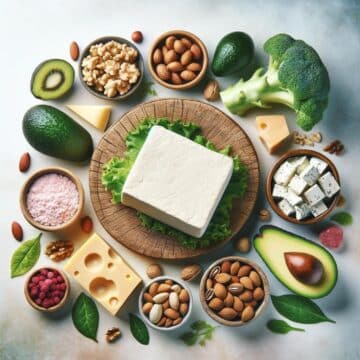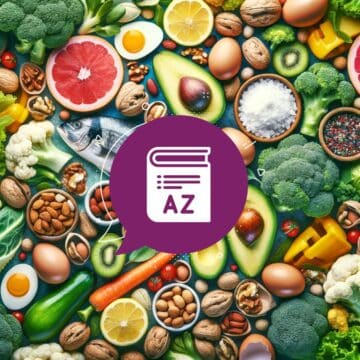Ever since keto began trending as a weight-loss (and health-improving) diet, health experts have been warning about its supposed dangers. Those more familiar with keto know these concerns are misguided; keto has a long track record, not only in clinical research but also through human evolution [1].
However, there are stages in one’s life when it’s only natural to feel concerned about any lifestyle change. And no more is that true than during pregnancy but also breastfeeding.
If you’re a new mom thinking about going keto, you are probably wondering whether this is a sound thing to do. Specifically, you’re concerned about the safety of ketosis while breastfeeding and whether keto may affect milk quality.
Is Keto Safe for Breastfeeding Moms?
The short answer is, we don’t know. That’s simply because not much research exists on the subject. But from the evidence we have, keto may not be safe in this case.
Specifically, there’s concern keto can put breastfeeding moms at risk of lactation ketoacidosis. Ketoacidosis is a dangerous condition characterized by the uncontrolled production of ketone bodies, which leads to blood becoming acidic.
Most cases of ketoacidosis are due to diabetes, starvation, and alcoholism. Lactation ketoacidosis, on the other hand, is rare in humans but fairly common in cows and other animals [2]. Researchers believe it takes place when the energy demands of milk production far exceed energy availability.
To date, there have been only 18 reported cases of lactation ketoacidosis since 1970, showing just how rare it is [3]. What’s also interesting about these cases is that in 76% of them the problem could be traced to weight loss attempts through diet and exercise.
But given the potential risks, no matter how small, you’ll often see breastfeeding described as a contraindication to the keto diet [4]. On the other hand, you’ll also hear countless anecdotes from moms who’ve had no issues breastfeeding while following a low-carb lifestyle.
Does Keto Affect Milk Supply?
It’s a common misconception that dieting and weight loss reduce milk supply. Studies have found that lactation was possible to some extent even in areas affected by famine. Research even found that milk volume isn’t affected by short-term fasting (like during Ramadan) [5].
Your baby’s appetite, nursing frequency, and stress are more likely to affect milk supply than any one diet.
It’s also a common misconception that low-carb diets reduce milk production because it lowers glucose levels — and glucose is a precursor to lactose. A study published in The American Journal of Clinical Nutrition on seven nursing mothers shows this may not be the case [6]. Milk volume was not affected following 8 days on a low-carb diet. But given the short sample size, short duration, and the fact the low-carb diet used was too high in carbs to cause ketosis (30% calories), these findings may not tell us much.
And in case you feel like your milk supply is too low, keep in mind that this could be your perception playing tricks on you. A recently published study found that up to 40% of new Australian moms felt their milk supply was not sufficient, and they got this idea from their babies seeming not satisfied following breastfeeding [7]. A consultation with a lactation specialist helped them gain confidence.
What About Nutrient Composition?
The study on seven nursing mothers mentioned earlier found that lactose and protein content of breast milk was not affected by a low-carb diet [6]. However, it also found that it contained 13-15% more fat and, thus, more calories.
Other than that, we know little about how low-carb diets affect breast milk composition. We can draw a couple of conclusions from what we generally know about breast milk [8]:
The body is usually capable of latching nutrients from a mother’s stores when her daily intake is below optimal.
In some cases, a mother’s diet can negatively affect the nutrient composition of breast milk, especially if it’s overly restrictive.
Either way, you don’t want nutrient deficiencies to put your own and your baby’s health at risk. And because keto excludes many foods, it’s natural to be concerned whether it could supply all the nutrients you need, especially now when your demands are much higher than before your pregnancy.
While there are reports of nutrient deficiencies with low-carb diets, this is not always the norm [9]. Any diet can be nutrient insufficient if poorly planned, and keto is no exception. But when well-balanced, keto can exceed the minimum recommended intake for all nutrients as demonstrated in a hypothetical case study in BMJ Open [10].
What to Do if You Decide to Breastfeed while Keto
If you decide keto is the right diet to help you stay healthy, get more energy, or shed the baby weight, make sure to do the following:
Eat enough calories
On average, nursing moms should consume a minimum of 1800 calories a day. However, calorie needs depend on many factors (e.g. your weight, activity levels), so don’t see this as set in stone. Adequate calorie intake can help you avoid ketoacidosis.
Aim for moderate weight loss
If you need to lose a lot of weight while breastfeeding, do so gradually to minimize your risk of ketoacidosis.
Drink plenty of fluids
Ketosis can have a diuretic effect, which can put you at risk of dehydration. Make sure to drink fluids throughout the day, especially since lactation can bring your fluid needs further up.
Make your diet varied
A varied keto diet includes a wide range of low-carb veggies, nuts, seeds, berries, fish, meat, eggs, and high-fat dairy. Also, supplement your diet when appropriate.
Speak to your doctor
Keep your doctor updated on any dietary changes so they know how to monitor you.
Summary
New moms have successfully breastfed their babies while on a keto diet. They’ve lost weight in the process, felt great, and saw their little ones reach every milestone. But that doesn’t mean keto while breastfeeding isn’t without its risks.
While rare, ketoacidosis can happen when you follow a restrictive version of keto. You may also be at risk of nutrient deficiencies which could affect either your own health or the nutrient composition of your breast milk.
Following a keto diet that’s balanced in calories and varied can help you avoid all of these problems. Still, talk to your doctor about any concerns you might be having.
References:
Ludwig DS. The Ketogenic Diet: Evidence for Optimism but High-Quality Research Needed. J Nutr. 2020;150(6):1354-1359. doi:10.1093/jn/nxz308
Gleeson S, Mulroy E, Clarke DE. Lactation Ketoacidosis: An Unusual Entity and a Review of the Literature. Perm J. 2016;20(2):71-73. doi:10.7812/TPP/15-097
Al Alawi AM, Al Flaiti A, Falhammar H. Lactation Ketoacidosis: A Systematic Review of Case Reports. Medicina (Kaunas). 2020;56(6):299. Published 2020 Jun 17. doi:10.3390/medicina56060299
Watanabe M, Tuccinardi D, Ernesti I, et al. Scientific evidence underlying contraindications to the ketogenic diet: An update. Obes Rev. 2020;21(10):e13053. doi:10.1111/obr.13053
Institute of Medicine (US) Committee on Nutritional Status During Pregnancy and Lactation. Nutrition During Lactation. Washington (DC): National Academies Press (US); 1991. 5, Milk Volume. Available from: https://www.ncbi.nlm.nih.gov/books/NBK235589/
Mohammad MA, Sunehag AL, Haymond MW. Effect of dietary macronutrient composition under moderate hypocaloric intake on maternal adaptation during lactation. Am J Clin Nutr. 2009;89(6):1821-1827. doi:10.3945/ajcn.2008.26877
Kent JC, Ashton E, Hardwick CM, Rea A, Murray K, Geddes DT. Causes of perception of insufficient milk supply in Western Australian mothers. Matern Child Nutr. 2021;17(1):e13080. doi:10.1111/mcn.13080
Dror DK, Allen LH. Overview of Nutrients in Human Milk. Adv Nutr. 2018;9(suppl_1):278S-294S. doi:10.1093/advances/nmy022
Kenig S, Petelin A, Poklar Vatovec T, Mohorko N, Jenko-Pražnikar Z. Assessment of micronutrients in a 12-wk ketogenic diet in obese adults. Nutrition. 2019;67-68:110522. doi:10.1016/j.nut.2019.06.003
Zinn C, Rush A, Johnson R. Assessing the nutrient intake of a low-carbohydrate, high-fat (LCHF) diet: a hypothetical case study design. BMJ Open. 2018;8(2):e018846. Published 2018 Feb 8. doi:10.1136/bmjopen-2017-018846








Leave a Reply